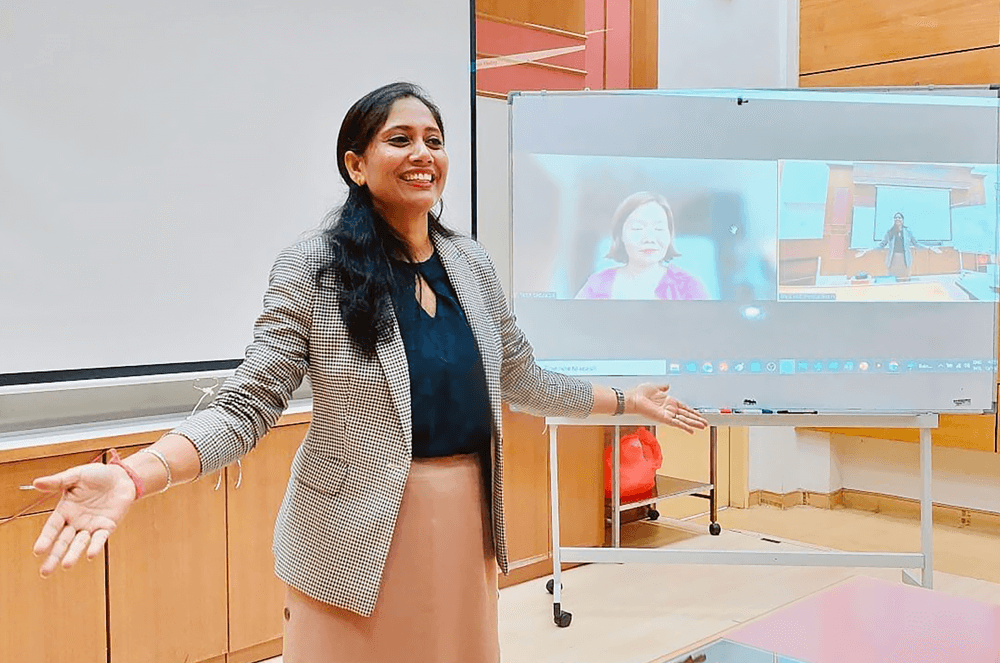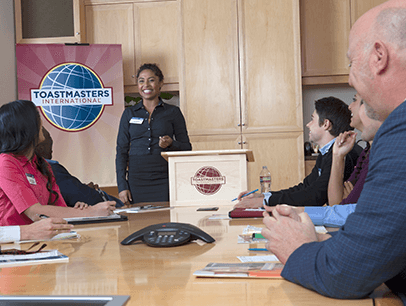
Having a high self-esteem can help many of us accomplish our biggest goals in life. Take Oscar, a small, fluffy, white Bichon Frise dog, for example. Nothing was going to stop Oscar from his goal of being free to explore the great outdoors of his Winnipeg neighborhood. Not even an invisible fence.
The grating noise and subsequent jolt from the electric collar that successfully stops most dogs from daring to cross a property line was no match for the determined dog, much to the dismay of his owner, Greg Wood, DTM, who chased after his Houdini impersonator on several occasions.
“He was willing to put up with the pain to get what he wanted. It’s the same with us moving beyond our self-limiting beliefs,” says Wood, a Toastmasters Accredited Speaker in Manitoba, Canada, and a frequent speaker on self-esteem. “We need to pass through that pain. No one’s going to get their dreams in the comfort zone.”
Oscar embodied the essence of exceptional self-esteem: The power to go beyond our limits, whether self-imposed or set by others. It is the driving force that brings most people to Toastmasters. But it is also a concept frequently conflated with confidence, another attribute of good leaders and speakers.
“You can’t meet your dream with low self-esteem.”
—GREG WOOD, DTM, ASSelf-Esteem vs. Confidence
Although self-esteem and confidence are similar concepts, they are not interchangeable. Confidence is the knowledge that we have developed the skills to successfully accomplish a task. Not enough confidence and you won’t even try; too much confidence and you risk being overconfident and aiming for goals that you aren’t ready for, Wood cautions.
On the other hand, self-esteem is the self-worth we build inside ourselves and the distance we place between us and success, Wood says. Low self-esteem manifests itself through impostor syndrome. Take public speaking, for example. You might have the experience and technical ability to appear before an audience to deftly deliver a presentation, but you don’t feel deserving of the opportunity: “I shouldn’t be here. They should have paid a professional,” our waning self-worth might declare.
This is why poor self-esteem is such a powerful barrier to believing in achieving. “You can’t meet your dream with low self-esteem,” Wood says.
5 Steps to Increase Your Self-Esteem
High self-esteem is directly correlated with greater personal and professional success. For many years, parents and developmental psychologists translated this into rewarding children with participation trophies and attendance ribbons. But the intended effect of increasing self-esteem was lost in the hollow recognition. Recognizing hard work and grit has a much greater outcome with resilience and success, according to bestselling author and child psychologist Carol Dweck.
The good news is that, unlike confidence, there is no ceiling on self-esteem: Our imagination is the limit. Even better, self-esteem is the ultimate DIY project, and probably the most important home-grown produce that you will ever cultivate.
“You’ve got to do it yourself. Other people can’t build your self-esteem, and you can’t rely on what other people think of you,” Wood says.
Wood, a magician by trade, has developed a 5-step process to boost self-esteem, which combines to form the acronym “magic”:
1.
Move beyond self-limiting beliefs and, yes, even fences. Unleash your inner Oscar by taking small risks or by challenging yourself to do something outside of your comfort zone. Maybe it is delivering a humorous speech or serving as grammarian when English isn’t your first language.2.
Add value to others. Assisting others, such as serving in a leadership role in your Toastmasters club, helps other people and, in turn, builds you up. “It’s really hard to feel bad about yourself when you’re doing something good for somebody else,” Wood notes.3.
Guard your self-talk. If you introduce yourself to new people by admitting that you are bad at remembering names, you are speaking defeat aloud and it can become a self-fulfilling prophecy, Wood says. Instead, share that you are working on getting better with names. Self-talk speaks the loudest, so make sure you are saying the best things.4.
Identify a one-word strategy. Motivational speaker John Maxwell suggests you start by writing down 100 positive traits about yourself, a challenging exercise that forces you to acknowledge that you bring a lot to the table. From there, Wood says to pick one of these positive attributes as your core or North Star. Wood’s is “stick-to-itiveness,” which means he perseveres no matter what.5.
Compare yourself to you and only you. Your journey is yours alone, so you can only measure your progress to where you were a month ago, a year ago, or more. Toastmasters is perfectly suited for this because speech evaluations and post-speech assessments help you see how far you have come.

Rashmi Radhav, DTM, of Melaka, Malaysia, credits Toastmasters with boosting her self-esteem by offering her challenges as well as community.
Improving Self-Esteem Through Toastmasters
Joining a Toastmasters club is a great way to help boost your self-esteem. From improving your presentations through evaluations and gaining experience as an officer to becoming a confident speaker and leader, Toastmasters helps members recognize their self-worth and can often lead to personal or professional success.
Rashmi Raghav, DTM, a member of Famosa Toastmasters Club in Melaka, Malaysia, is a perfect example. Raghav grew up very sheltered within her protective family in New Delhi, India, she says. Every need was met—as were all her goals, including school, career, and marriage. Yet, her childhood photos show a girl who never smiled. “I realized I [was] lacking the confidence to voice up, stand up, and speak up,” she recalls.
Raghav ended up marrying a man who was her emotional polar opposite. His fearlessness of adversity was a counterweight to her emotional calm. Then came a life-changing move across the Bay of Bengal to Malaysia.
Far from her creature comforts, in a new country with diverse cultures and languages, she felt unmoored and hesitant to make connections lest she offend others. That is until her husband introduced her to Toastmasters. She attended some meetings and excitedly volunteered to help her husband with his speeches. It sparked a desire to join a club herself, which she did in 2018.
“I was very clear with a question in my mind why I’m joining Toastmasters. I want to be the better version of myself. I want to see Rashmi as a confident public speaker,” she says now. Her vision became a reality in 2023 when she took a full-time role as a corporate trainer. She now teaches emotional intelligence to audiences from various industries.
“When I see people connect with my stories … that brings a beautiful smile on my face,” Raghav says. “It’s increasing day by day because I’m getting connected to the people. I’m inspiring them. I’m influencing them about their hidden potential.”
Centered on Core Values
Raghav credits her transformation to the opportunities she got through Toastmasters. For example, serving as the Public Relations Manager for District 102, she was able to double-down on her strengths and delegate her weaknesses to others. She also surrounded herself with like-minded leaders. As it turns out, leadership isn’t so challenging when it feels like an extension of family.
Ultimately, Raghav says her self-esteem soared when she became clear about her core values, or her “compass.” Family comes first, followed by honesty and integrity.
Knowing what matters most to her also improved her self-talk, which further helped to drown out negative noise about presenting her culture too much when she speaks. “Connecting with my roots gives a different kind of confidence within me,” she said. “And when I am embracing this with full confidence, it helps to build that self-esteem.”
Emily Sachs, DTM is a freelance writer in Brooklyn, New York. She is the Immediate Past District 119 Director and is a regular contributor to the Toastmaster magazine.
Related Articles

Personal Growth
Rebuild Your Self-Confidence and Self-Esteem

Personal Growth



 Previous
Previous

 Previous Article
Previous Article